Preview: What to expect from upcoming presidential debate on energy
Change Size
 Presidential candidates Joko Widodo-Ma'ruf Amin, General Elections Commission (KPU) chairman Arief Budiman (center) and presidential candidates Prabowo Subianto-Sandiaga Uno are on stage during the first candidate debate on Thursday, Jan. 18, 2019. (JP/Dhoni Setiawan)
Presidential candidates Joko Widodo-Ma'ruf Amin, General Elections Commission (KPU) chairman Arief Budiman (center) and presidential candidates Prabowo Subianto-Sandiaga Uno are on stage during the first candidate debate on Thursday, Jan. 18, 2019. (JP/Dhoni Setiawan)
I
n less than a week, President Joko “Jokowi” Widodo and Prabowo Subianto will once again face each other in the second-round presidential debate. Organized by the General Election Commission (KPU) on Feb. 17, the event will see both candidates explain to the public their views and plans on energy, food, natural resources, the environment and infrastructure.
What is the candidates’ vision and plans on the energy sector? The following are some of the issues The Jakarta Post has observed since last year during their limited encounters.
What do the candidates say about the energy sector?
From two events that were held in November 2018 at the Indonesia Energy Economic Forum (IEEF) and more recently this month at a discussion held by global environmental watchdog Greenpeace, the push for renewable energy was the highlight of both candidates, who believe it can be a solution to the country’s declining dependence on oil production and other fossil-based resources.
The term “import” has a negative meaning to the country because high imports have led to a trade deficit. The energy sector has been one of the contributors to imports as almost half of the national oil demand is still imported due to lack of large oil discoveries.
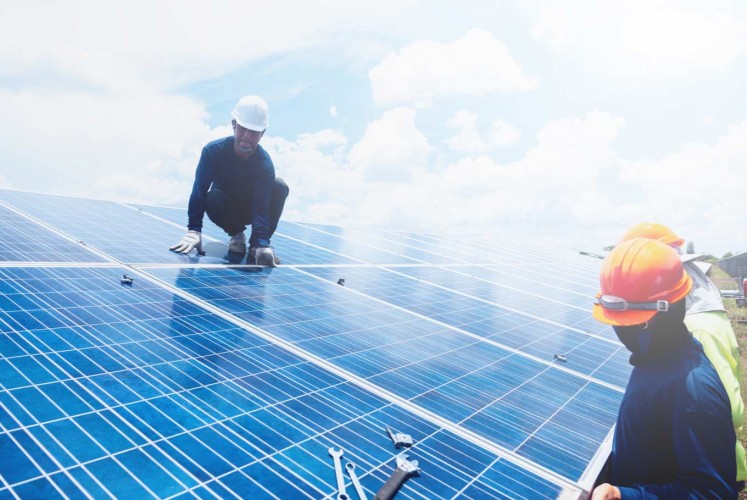
Addressing this issue, Prabowo’s camp wants a relatively radical change or “instant and concrete” action if he is elected, whilst the incumbent wants a gradual transition from dirty to clean energy.
“Prabowo has a mega project to boost the use of bioenergy from ethanol and it will be done in a massive and concrete movement,” Ramson Siagian, a campaigner for Prabowo, said during the Greenpeace seminar.
“One of his mega plans is to revise several power plant contracts in the current government’s 35 gigawatts project. The revision will include shifting from coal-fired power plants to renewable energy-based power plants. This is a concrete move to overhaul existing energy policies,” he said.
The Prabowo camp’s vision and mission is to turn Indonesia into a super power in bioenergy by utilizing 88 million hectares of damaged forests for bioethanol materials, such as sugar palm, and then to convert the use of fossil fuel to gas and other renewable energy for power generation for state electricity firm PLN.
Under the Indonesia Triumphant strategy, the retired army general and his running mate, former Jakarta deputy governor Sandiaga Uno, also plan to develop the downstream industry for coal.
“We are also ready for several coal downstreaming projects, namely Biocoal, Biochar and Syngas, all of which will be carried out at a massive scale. We will utilize unused forests,” he said.
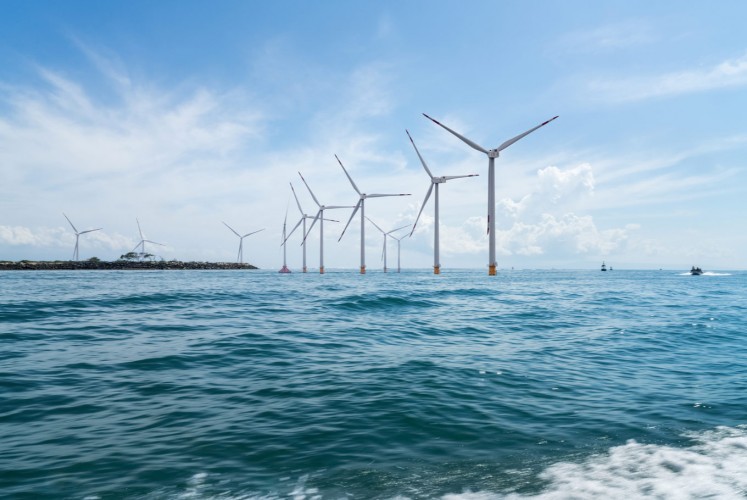
The Prabowo camp’s focus on renewable energy rather than fossil energy is made in the backdrop of a decreasing trend in both supply and demand, according to a presentation by Sudirman Said, a Prabowo supporter.
“We have been warned [by former energy minister Subroto] that our country’s fossil energy depletion won’t be followed with the development of renewable energy […] We have all the perfect plans [for renewable energy], but they are hampered by derivative policies, such as on tariffs,” he said.
Coincidentally, Prabowo’s brother, Hashim Djojohadikusumo, owns diversified Arsari Group, which that primarily focuses on renewable energy, including the production of bioethanol, according to the International Conference on Sustainable Development (ICSD).
On the other side, the Jokowi camp’s focus on energy issues was mostly represented by Arif Budimanta, vice chairman of the National Economic and Industry Committee (KEIN), who concurred that renewable energy was the future energy source for Indonesia but can only be successfully implemented gradually.
“Currently, coal has the lowest cost [of production] and doesn’t need to be imported. But when the people’s economy has become better, then the utilization of coal [for energy] could be decreased,” he said.
The Jokowi-Ma’ruf Amin camp has outlined three missions related to the energy sector, namely pushing for the use of renewable energy, efficiently using fossil-fuel energy by increasing its production and creating more value-added and developing a local renewable energy facility.
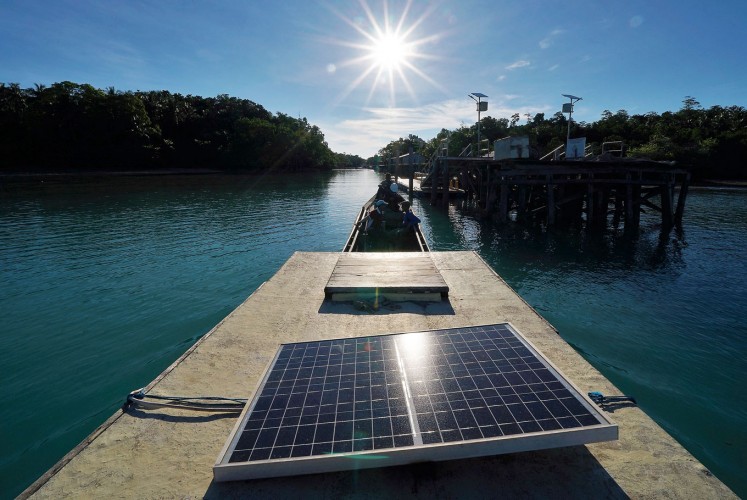
Giving the example of efficient use of fossil energy, Arif said Jokowi would continue perfecting the policy to mix palm oil (CPO) derivatives, Fatty Acid Methyl Esters (FAME) and diesel fuel, aiming to reduce oil imports.
“We acknowledge the urgency to revamp the governance of the palm oil industry, which has been criticized for its environmental impact. However, we have to remember it will have a greater [environmental impact] if we develop bioenergy from sugar palm. How much land will be used? It is better to improve what we already have,” he said, criticizing Ramson’s statement.
Likely questions in the debate
The local chapter of United Kingdom-based extractive industry watchdog Publish What You Pay (PWYP) recently shared its suggestions for topics to be discussed in the upcoming presidential debate, comprising two main ideas: energy security and managing resources.
First and foremost, PWYP questions the candidates on how they will be consistent between planning and implementing as it noted failures in the past year, such as coal production that has – in at least the last four years – exceeded the initial plan stipulated in the National Medium-Term Development Plan (RJPMN) 2015-2019
The next challenge is how the next government could address the issue of energy depletion, which will lead to higher prices, as the country still depends a lot on fossil fuels, which is expected to run out in less than 50 years.
Both camps also have to come up with a clear plan or strategy to fill the gap and lack of infrastructure, especially oil refineries and facilities to process gas resources that will run out after 2061, or later than oil and coal reserves.
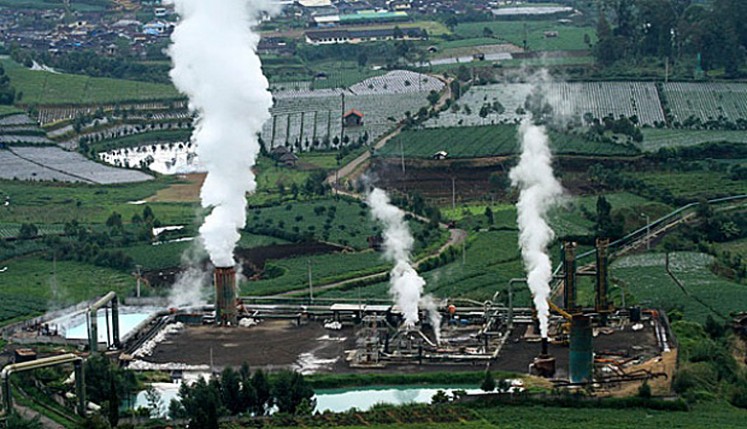
PWYP noted the importance of infrastructure as the government has delayed finishing the Regasification Floating Storage Unit (RFSU) to process liquefied natural gas (LNG) for six years.
Lastly, on the topic of energy security, PWYP questions the candidates on the energy dilemma of prioritizing environment goals or depending on dirty energy because of economic factors.
On how energy management should best be done, PWYP suggested seven topics that should be asked to the candidates, namely: transparency of permit issuance, control of coal production, fiscal dependency on extractive industry, downstreaming efforts, corruption in the sector, decentralization of natural resources, and the environmental and social impacts of the extractive industry.
What experts expect from the debate
Alin Halimatussadiah, head of the Institute for Economic and Social Research (LPEM FEB-UI), said from her observation of Thursday’s discussion, both candidates understand the importance of clean energy.
However, she believes that politically speaking, the environment has yet to become a populist issue as majority of Indonesian people have yet to be aware about the urgency of it.
“Unluckily, I don’t know whether the environment will be discussed or not. But we need to further discuss it to make it an urgent issue, then they [both candidates] will talk about it,” she told The Post.
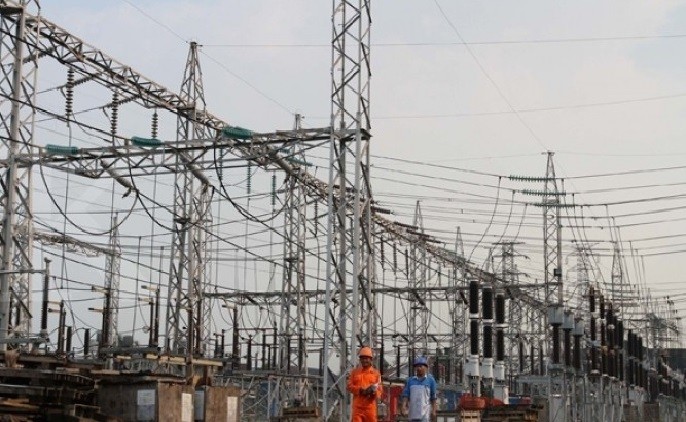
Furthermore, Alin criticized how both candidates failed prior to the debate to present clear instruments or tools to address the problems that slowed the progress of renewable energy.
“For example, do they want to implement fiscal incentives such as carbon pricing or taxing? Because we know that a transition needs to give one sector more incentives while other is reduced,” she added.
The sector she wants to see receive more support is renewable energy and the one to be reduced is dirty energy, such a coal and fossil fuel, which is still subsidized.
Fabby Tumiwa, the executive director for local energy watchdog Institute for Essential Services Reform (IESR), agreed with Alin’s statement, saying that both candidates were locked in populist issue, such as cheap energy.
“The current political reality dictates both candidates to promise cheap energy to the people. However, we know the reality is energy isn’t cheap, so the candidates should able to elaborate on how to achieve that without causing a fiscal burden,” he said.
Fabby, who has been an avid critic on renewable energy, further said both candidates should be able to also answer about the environmental impact of their upcoming energy policies to the public.









